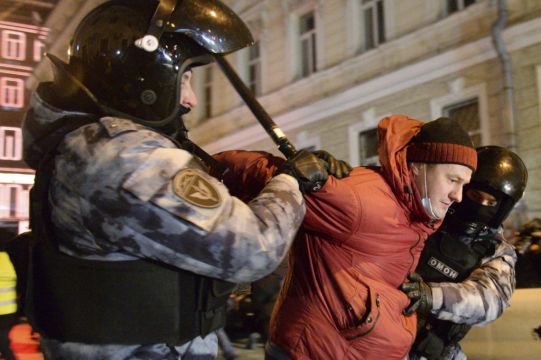Hundreds of people have been arrested during a night of protests after a Russian court ordered opposition leader Alexei Navalny to prison for more than two and a half years years, finding that he violated the terms of his probation while recuperating in Germany from nerve-agent poisoning.
The ruling ignited protests in Moscow and St Petersburg as Mr Navalny, the most prominent critic of President Vladimir Putin, denounced the proceedings as a vain attempt by the Kremlin to scare millions of Russians into submission.
Helmeted riot police grabbed demonstrators without obvious provocation and put them in police vehicles. The Meduza website showed video of police roughly pulling a passenger and driver out of a taxi.
The ruling came despite massive protests across Russia over the past two weekends and Western calls to free the 44-year-old anti-corruption campaigner.
“We reiterate our call for the Russian government to immediately and unconditionally release Mr Navalny, as well as the hundreds of other Russian citizens wrongfully detained in recent weeks for exercising their rights, including the rights to freedom of expression and of peaceful assembly,” US secretary of state Antony Blinken said after the ruling.
The protests lasted until about 1am, and about 650 people were arrested, according to OVD-Info, a group that monitors political arrests.
The prison sentence stems from a 2014 embezzlement conviction Mr Navalny has rejected as fabricated and politically motivated.
He was arrested on January 17 on returning from a five-month convalescence in Germany from the nerve-agent attack, which he has blamed on the Kremlin.
Moscow denies any involvement. Despite tests by several European labs, Russian authorities said they have no proof he was poisoned.
As the order was read, Mr Navalny smiled and pointed to his wife Yulia in the courtroom and traced the outline of a heart on the glass cage where he was being held. “Everything will be fine,” he told her as guards led him away.

Earlier in the proceedings, he attributed his arrest to Mr Putin’s “fear and hatred”, saying the Russian leader will go down in history as a “poisoner”.
“I have deeply offended him simply by surviving the assassination attempt that he ordered,” he said.
“The aim of this hearing is to scare a great number of people. You can’t jail the entire country.”
Russia’s penitentiary service said Mr Navalny violated the probation conditions of his suspended sentence from the 2014 conviction. It asked the court to turn his three and a half-year suspended sentence into a custodial term, although about a year he spent under house arrest will be counted as time served.
Mr Navalny emphasised that the European Court of Human Rights ruled that his 2014 conviction was unlawful and Russia paid him compensation in line with the ruling.
He and his lawyers have argued that while he was recovering in Germany from the poisoning, he could not register with Russian authorities in person as required by his probation.
He also said his due process rights were crudely violated during his arrest and described his jailing as a travesty of justice.

Tens of thousands of people took to the streets over the past two weekends to demand his release and chant slogans against Mr Putin.
On Sunday, police detained more than 5,750 people nationwide, which was the biggest one-day total in Russia since Soviet times.
Most were released after being handed a court summons, and they face fines or jail terms of seven to 15 days, although several face criminal charges of violence against police.
“I am fighting and will keep doing it even though I am now in the hands of people who love to put chemical weapons everywhere and no one would give three kopecks for my life,” Mr Navalny said.
Kremlin spokesman Dmitry Peskov said Russia is ready for dialogue about Mr Navalny, but warned it would not take Western criticism into account.
“We are ready to patiently explain everything, but we aren’t going to react to mentor-style statements or take them into account,” he told reporters.







